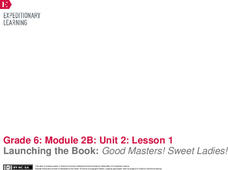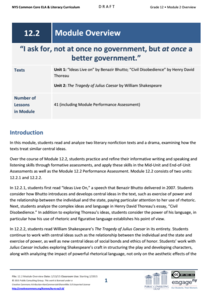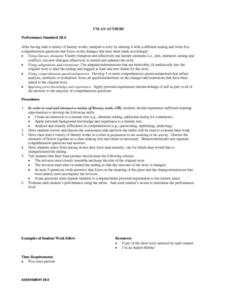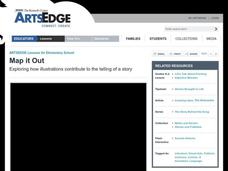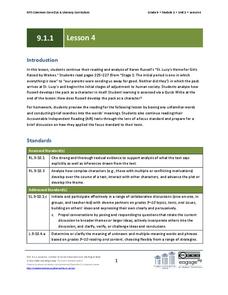EngageNY
Establishing Structures for Reading: Gathering Evidence about Salva’s and Nya’s Points of View (Reread Chapters 1 and 2)
Readers practice gathering textual evidence to support their understanding of character point of view in A Long Walk to Water by Linda Sue Park. Working with partners, they complete a Gathering Evidence graphic organizer and engage in...
EngageNY
Citing Evidence: The Ending of Pygmalion
Show time! After completing questions over Pygmalion section nine, scholars perform a reader's theater activity of pages 87-88. They then revisit their Eliza Character Trackers and add details as needed.
EngageNY
Launching the Book: Good Master! Sweet Ladies!
Every person has a different story to tell. Scholars take a quick look at the book Good Masters! Sweet Ladies! Voices from a Medieval Village. They discover that each character tells a different story. They then look at one...
EngageNY
Grade 12 ELA Module 2
The second module in a series for high school seniors focuses on tracking the central idea of a text across genres and from multiple author and character perspectives. Twelfth graders read a speech by Benazir Bhutto entitled "Ideas Live...
Curated OER
Close Reading of “The Necklace”
Designed for teachers, this 12-page packet uses passages from Guy de Maupassant's "The Necklace" to model how to design activities that encourage close reading of complex text.
Pace University
Short Stories
A reading of Kevin Lamb's short story "Lost in the Woods" launches a study of how writers use elements such as foreshadowing, mood, character development, setting, and conflict to engage readers. Class members then demonstrate what they...
National Endowment for the Humanities
Scrooge as He is Revealed during the Ghostly Experiences
Readers learn how to use both direct and indirect characterization clues provided by Charles Dickens to understand the complexity of Ebenezer Scrooge's character. Scholars collect evidence of comments Scrooge hears, how he responds to...
Curated OER
I Am An Author
Analyze and interpret a literary work your class has read during the course. After reading a variety of literary works, middle schoolers alter the ending of a selection by creating an alternate ending. They generate five comprehension...
Curated OER
Cartoons for the Classroom: John Q. Public
John Q. Public was a notable cartoon representation of the average American; but how accurate was this portrayal? Emergent analysts consider several topical points as they take a critical look into a cartoon portrayal of the American...
Curated OER
That's Moor Like It!
How do modern adaptations of Shakespearean plays relate to their original source material? Middle and high schoolers focus on Shakespeare's play Othello and its screen adaptation "O" to explore how modern film adaptations of Shakespeare...
Curated OER
The Sorcerer's Apprentice: 200 Greatest Pop Culture Icons
Upper graders view the animated short, "The Sorcerer's Apprentice" and analyze how the music score was chosen to express the scene. They create an animation as they listen to a classical recording to experience the connection between...
Curated OER
"Eine Kleine Nachtmusik"
Mozart was an amazing composer and "Eine Kleine Nachtmusik" was one of his best-loved orchestral pieces. This handout provides a brief description of the instruments for which it was written, and how each section and part should be...
Curated OER
Map It Out
Explore how illustrations add to a story. Young learners will look at picture books to see how the pictures tell the story. They create illustrations to go with a chosen story, and then flip the activity so they have to write a story to...
Curated OER
Create a Walking Tour of San Francisco's Chinatown
Take a tour of Chinatown as it was in the 1800's. Analyzing primary source images and documents, learners will gain a better understanding of the myths and misconceptions of Chinese immigrants during the 1800's. They create a pamphlet to...
EngageNY
Getting the Gist and Determining Word Meaning: Paragraphs 20–23 of Steve Jobs’ Commencement Address (and connecting to Chapter 10)
Groups create a list of the character traits of Steve Jobs and Buddy, the main character of Christopher Paul Curtis' Bud, Not Buddy, and share and select evidence from Jobs' 2005 Stanford University Commencement Address to support their...
EngageNY
Grade 9 ELA Module 1, Unit 1, Lesson 13
Finish Karen Russell's "St. Lucy's Home for Girls Raised by Wolves" with an instructional activity focusing on the story's conclusion. After participating in literary analysis discussions with small groups, ninth graders complete a Quick...
EngageNY
Grade 9 ELA Module 1, Unit 1, Lesson 17
Eighth graders demonstrate their understanding with the final assessment in a literary analysis unit based on Karen Russell's short story, "St. Lucy's Home for Girls Raised by Wolves." Having prepared for the assessment in the last few...
EngageNY
Grade 9 ELA Module 1, Unit 1, Lesson 16
Prepare for the end-of-unit assessment in a unit focused on Karen Russell's "St. Lucy's Home for Girls Raised by Wolves." As your class continues gathering evidence to support or argue against the success of Claudette's adaptation into...
EngageNY
Grade 11 ELA Module 4 Overview
The intricate craft of narrative writing can make a happy story feel exuberant or a sad story feel devastating. With 42 extensive lessons that include poignant discussion questions, standards-aligned self-reflections, engaging writing...
California Education Partners
Glass Menagerie
As a reading comprehension assessment, ninth graders are asked to use evidence drawn from The Glass Menagerie to support an analysis of how Tennessee Williams uses specific lines to develop Amanda's character as well as her...
K12 Reader
Analyzing O! Pioneers
Readers of O! Pioneers are asked to cite evidence from a paragraph of Willa Cather's novel to support an analysis of Alexandra Bergson, the personal qualities she possesses, and how these qualities will help the Bergson family after her...
EngageNY
Grade 9 ELA Module 1, Unit 1, Lesson 4
Connect with the text using helpful annotation strategies. As your class reads the first section of Karen Russell's short story, "St. Lucy's Home for Girls Raised by Wolves," they note important passages that establish character...
EngageNY
Grade 9 ELA Module 1, Unit 1, Lesson 6
Can you tell everything about a character based on their actions? Delve into the prominent characters of Karen Russell's "St. Lucy's Home for Girls Raised by Wolves" with helpful reading tips and discussion questions. A thorough lesson...
EngageNY
Grade 10 ELA Module 1: Unit 2, Lesson 8
Now what? Class members continue their close reading of Ethan Canin’s short story “The Palace Thief,” focusing on Hundert's feelings about his retirement, and consider what these feelings reveal about his character.
Other popular searches
- Character Analysis Essay
- Theatre Character Analysis
- Character Sketch Outlines
- Writing a Character Analysis
- Character Sketch Lesson Plan
- Character Analysis Seedfolks
- Character Study Lesson Plans
- Character Sketch Examples
- Character Analysis Worksheets
- Character Analysis Writing
- Descriptive Character Sketch
- Character Analysis Lessons


